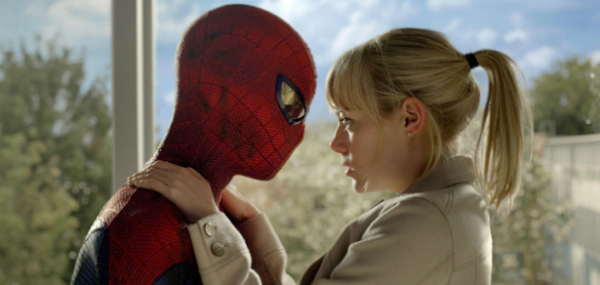Movie review by Greg Carlson
Alighting only a decade after Sam Raimi’s big budget feature and a mere five years since the awful conclusion of the trilogy (if you want to call it that), director Marc Webb’s “The Amazing Spider-Man” simply refuses to be described by critics without some measure of comparison to the 2002 version. Of course, various media incarnations of Marvel’s marquee hero have been retelling Peter Parker’s origin mythology since the character took off in 1962, and like DC’s juggernaut Batman, one assumes we will have fresh incarnations as long as ticket buyers are willing to line up.
Music video whiz Webb, whose debut feature “(500) Days of Summer” immediately marked him as an unorthodox choice to take the reins of a massive franchise film when the decision was first announced, effectively handles most of the human elements and adequately dispatches the complex special effects, although to my eye, Rhys Ifans in full-blown Lizard mode is ridiculously oversized – three or four feet taller and more than one hundred pounds heavier than he appeared in “The Amazing Spider-Man” #6 in 1963. Ifans, like Dylan Baker before him, is a great choice to play the yearning, Jekyll/Hyde-like Dr. Curtis Connors, but the role is predictably malnourished and utterly humorless and could have used a lot more of Ifans’ wit.
Beyond the uninspired plot machinery that grinds toward the staple entire-city-in-peril climax, “The Amazing Spider-Man” is far from ideal, and for truehearted fanboys and fangirls, there was no need to meddle with a backstory linking Peter’s parents to whatever shocking revelations await us in the sequels. Less charitable critics have denounced the reboot as a desperate legal requirement allowing Sony Pictures to keep the movie rights from reverting to Marvel, but the outcome – superior to Raimi’s vision in some places and subordinate in others – suggests that enough care was taken to distinguish the new material (lame Stan Lee cameo notwithstanding).
Among the most inventive applications of the point-counterpoint debate mulling the merits of Tobey Maguire versus Andrew Garfield in the title role was laid out by Linda Holmes for NPR. Playing with the finer distinctions between the nerd and the geek, Holmes argues that Webb’s film improves on Raimi’s work by providing Peter with a set of conditions allowing him to operate outside the boundaries and expectations of the future Spider-Man as a bullied nebbish. Holmes astutely points out that Garfield’s Peter Parker chooses to isolate himself from the cliques and peer groups that dominate life in high school.
Holmes goes on to pinpoint another key argument in favor of Webb’s edition: Garfield and Emma Stone share a genuine chemistry with one another and Stone’s Gwen Stacy is not obliged to follow the Lois Lane trope in which so much tension in the developing romantic relationship between the protagonists revolves around her ignorance of Spidey’s secret identity. Holmes claims that the omission of “mistaken identity misdirection” makes Gwen “substantially more conscious as a character,” and this is certainly true up to a point. While Stone’s performance is warm and earnest, the script never satisfactorily determines what to do with Gwen during the climax (spoiler: she has to stand around waiting for an antidote to synthesize). One admires the effort to avoid making her the more typical damsel in distress, but given the de rigueur battle showdown between the super hero and the super villain, I for one would have loved to see Gwen do something totally unexpected.
